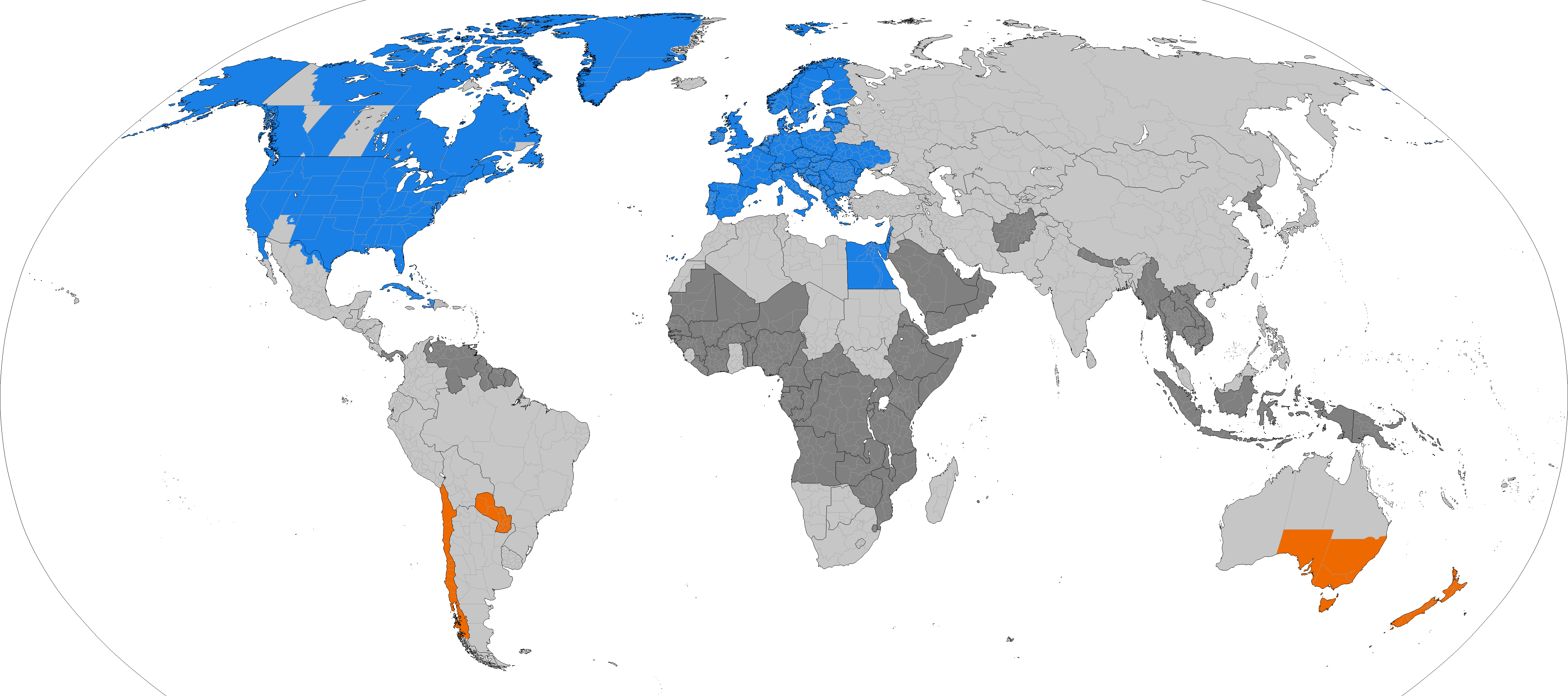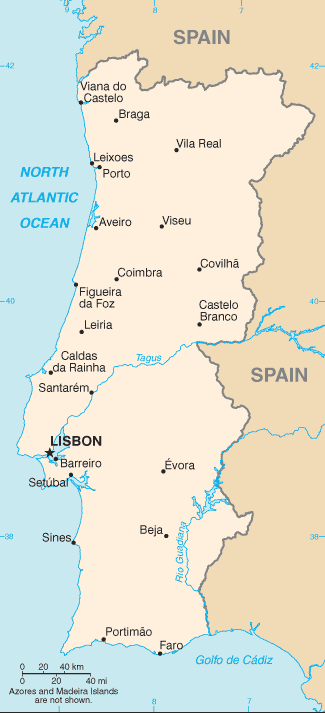|
Western European Summer Time
Western European Summer Time (WEST, UTC+01:00) is a summer daylight saving time scheme, 1 hour ahead of Greenwich Mean Time and Coordinated Universal Time. It is used in: * the Canary Islands * Portugal (including Madeira but not the Azores) * the Faroe Islands The following countries also use the same time zone for their daylight saving time but use a different title: *United Kingdom, which uses British Summer Time (BST) *Ireland, which uses Irish Standard Time (IST) ( (ACÉ)). Also sometimes erroneously referred to as "Irish Summer Time" (). The scheme runs from the last Sunday in March to the last Sunday in October each year. At both the start and end of the schemes, clock changes take place at 01:00 UTC+00:00. During the winter, Western European Time (WET, GMT+0 or UTC±00:00) is used. The start and end dates of the scheme are asymmetrical in terms of daylight hours: the vernal time of year with a similar amount of daylight to late October is mid-February, well before ... [...More Info...] [...Related Items...] OR: [Wikipedia] [Google] [Baidu] |
Daylight Saving Time
Daylight saving time (DST), also referred to as daylight savings time or simply daylight time (United States, Canada, and Australia), and summer time (United Kingdom, European Union, and others), is the practice of advancing clocks (typically by one hour) during warmer months so that darkness falls at a later clock time. The typical implementation of DST is to set clocks forward by one hour in the spring ("spring forward"), and to set clocks back by one hour in the fall ("fall back") to return to standard time. As a result, there is one 23-hour day in early spring and one 25-hour day in the middle of autumn. The idea of aligning waking hours to daylight hours to conserve candles was first proposed in 1784 by U.S. polymath Benjamin Franklin. In a satirical letter to the editor of ''The Journal of Paris'', Franklin suggested that waking up earlier in the summer would economize on candle usage; and calculated considerable savings. In 1895, New Zealand entomologist and astronome ... [...More Info...] [...Related Items...] OR: [Wikipedia] [Google] [Baidu] |
Western European Time
Western European Time (WET, UTC±00:00) is a time zone covering parts of western Europe and consists of countries using UTC±00:00 (also known as Greenwich Mean Time, shortly called GMT). It is one of the three standard time zones in the European Union along with Central European Time and Eastern European Time. The following Western European countries and regions use UTC±00:00 in winter months: *Portugal, since 1912 with pauses (except Azores, UTC−01:00) *United Kingdom and Crown Dependencies, since 1847 in England, Scotland, Wales, the Channel Islands, and the Isle of Man, and since 1916 in Northern Ireland, with pauses *Ireland, since 1916, except between 1968 and 1971 *Canary Islands, since 1946 (rest of Spain is CET, UTC+01:00) *Faroe Islands, since 1908 * Madeira islands, since 1912 with pauses * North Eastern Greenland ( Danmarkshavn and surrounding area) *Iceland, since 1968, without summer time changes All the above countries except Iceland implement daylight savi ... [...More Info...] [...Related Items...] OR: [Wikipedia] [Google] [Baidu] |
Dublin Mean Time
Ireland uses Irish Standard Time (IST, UTC+01:00; ga, Am Caighdeánach Éireannach) in the summer months and Greenwich Mean Time ( UTC+00:00; ''Meán-Am Greenwich'') in the winter period. (Roughly half of the state is in the 7.5°W to 22.5°W sector, half is in the same sector as Greenwich: 7.5°E to 7.5°W). In Ireland, the Standard Time Act 1968 legally established that ''the time for general purposes in the State (to be known as standard time) shall be one hour in advance of Greenwich mean time throughout the year''. This act was amended by the Standard Time (Amendment) Act 1971, which legally established Greenwich Mean Time as a winter time period. Ireland therefore operates one hour behind standard time during the winter period, and reverts to standard time in the summer months. This is defined in contrast to the other states in the European Union, which operate one hour ahead of standard time during the summer period, but produces the same end result. The instant of t ... [...More Info...] [...Related Items...] OR: [Wikipedia] [Google] [Baidu] |
Military History Of The United Kingdom During World War II
The military history of the United Kingdom in World War II covers the Second World War against the Axis powers, starting on 3 September 1939 with the declaration of war by the United Kingdom and France, followed by the UK's Dominions and Crown colonies, on Nazi Germany in response to the invasion of Poland by Germany. There was little, however, the Anglo-French alliance could do or did do to help Poland. The Phoney War culminated in April 1940 with the German invasion of Denmark and Norway. Winston Churchill became prime minister and head of a coalition government in May 1940. The defeat of other European countries followed – Belgium, the Netherlands, Luxembourg and France – alongside the British Expeditionary Force which led to the Dunkirk evacuation. From June 1940, Britain and its Empire continued the fight alone against Germany. Churchill engaged industry, scientists and engineers to advise and support the government and the military in the prosecution of the w ... [...More Info...] [...Related Items...] OR: [Wikipedia] [Google] [Baidu] |
Parliament Of The United Kingdom
The Parliament of the United Kingdom is the supreme legislative body of the United Kingdom, the Crown Dependencies and the British Overseas Territories. It meets at the Palace of Westminster, London. It alone possesses legislative supremacy and thereby ultimate power over all other political bodies in the UK and the overseas territories. Parliament is bicameral but has three parts, consisting of the sovereign ( King-in-Parliament), the House of Lords, and the House of Commons (the primary chamber). In theory, power is officially vested in the King-in-Parliament. However, the Crown normally acts on the advice of the prime minister, and the powers of the House of Lords are limited to only delaying legislation; thus power is ''de facto'' vested in the House of Commons. The House of Commons is an elected chamber with elections to 650 single-member constituencies held at least every five years under the first-past-the-post system. By constitutional convention, all governme ... [...More Info...] [...Related Items...] OR: [Wikipedia] [Google] [Baidu] |
Focal (lexicographical Website)
Focal or FOCAL may refer to: *Focal (lexicographical website), an Irish lexicographical website *FOCAL (programming language), a programming language for the PDP-8 and similar machines *Focal (HP-41), for programming HP calculators *FOCAL (spacecraft), a proposed space telescope *FOCAL International, a trade body representing the film archive industry *Focal-JMLab, a French manufacturer of audio equipment *Focal Radio, a radio station based in Stoke-on-Trent, England *Focal neurologic signs See also *Focal point (other) Focal point may refer to: * Focus (optics) * Focus (geometry) * Conjugate points, also called focal points * Focal point (game theory) * Unicom Focal Point UNICOM Focal Point is a portfolio management and decision analysis tool used by the prod ... * Focus (other) * {{disambiguation ... [...More Info...] [...Related Items...] OR: [Wikipedia] [Google] [Baidu] |
Irish Statute Book
The Irish Statute Book, also known as the electronic Irish Statute Book (eISB), is a database produced by the Office of the Attorney General of Ireland. It contains copies of Acts of the Oireachtas and statutory instruments.electronic Irish Statute Book (eISB) . Office of the Attorney General from the original by . It also contains a Legislation Directory which includes chronological tables of pre-1922 legislation. [...More Info...] [...Related Items...] OR: [Wikipedia] [Google] [Baidu] |
Central European Time
Central European Time (CET) is a standard time which is 1 hour ahead of Coordinated Universal Time (UTC). The time offset from UTC can be written as UTC+01:00. It is used in most parts of Europe and in a few North African countries. CET is also known as Middle European Time (MET, German: MEZ) and by colloquial names such as Amsterdam Time, Berlin Time, Brussels Time, Madrid Time, Paris Time, Rome Time, Warsaw Time or even Romance Standard Time (RST). The 15th meridian east is the central axis for UTC+01:00 in the world system of time zones. As of 2011, all member states of the European Union observe summer time (daylight saving time), from the last Sunday in March to the last Sunday in October. States within the CET area switch to Central European Summer Time (CEST, UTC+02:00) for the summer. In Africa, UTC+01:00 is called West Africa Time (WAT), where it is used by several countries, year round. Algeria, Morocco, and Tunisia also refer to it as ''Central European ... [...More Info...] [...Related Items...] OR: [Wikipedia] [Google] [Baidu] |
Astronomical Observatory Of Lisbon
The Lisbon Astronomical Observatory ( pt, Observatório Astronómico de Lisboa) is an astronomical observatory located in ''Tapada da Ajuda'', in the civil parish of Alcântara, municipality of Lisbon. Recognized internationally for its quality of work in the field of positioning astronomy (since the 19th century), in 1992, it became a dependency of the University of Lisbon (and later, part of the Faculty of Sciences), responsible for scientific and historical research, along with media relations. History From an 1812 map, there existed in the ''Alto da Casa Branca'' in the Tapada of Ajuda an older observatory. The observatory was born from great controversy between French astronomer Hervé Faye (1814-1902), then director of the Observatory of Paris, and Peters, an astronomer at the Russian Observatory of Pulkova, on the parallax of the star of Argelander. The construction of the Lisbon observatory was due to a strong desire to build an institution that was a reference in Portugu ... [...More Info...] [...Related Items...] OR: [Wikipedia] [Google] [Baidu] |
Continental Portugal
Continental Portugal ( pt, Portugal continental, ) or mainland Portugal comprises the bulk of the Portuguese Republic, namely that part on the Iberian Peninsula and so in Continental Europe, having approximately 95% of the total population and 96.6% of the country's land. Mainland Portugal is therefore commonly called by residents of the Portuguese archipelagos of the Azores and Madeira the continent ( pt, o continente) in all respects including minor elements of combined governance from Lisbon, the country's capital. Before 1975, when the Portuguese territory also stretched to several now-independent states in Africa, the designation ''metropolis'' ( pt, metrópole) was also used. Context The designation ''mainland Portugal'' is used to differentiate the continental territory of Portugal from its insular territory. The latter comprises the archipelagos of Madeira and Azores in the Atlantic Ocean. The Azores and Madeira are also commonly referred to as the autonomous region ... [...More Info...] [...Related Items...] OR: [Wikipedia] [Google] [Baidu] |
Central European Summer Time
Central European Summer Time (CEST), sometimes referred to as Central European Daylight Time (CEDT), is the standard clock time observed during the period of summer daylight-saving in those European countries which observe Central European Time (CET; UTC+01:00) during the other part of the year. It corresponds to UTC+02:00, which makes it the same as Eastern European Time, Central Africa Time, South African Standard Time, Egypt Standard Time and Kaliningrad Time in Russia. Names Other names which have been applied to Central European Summer Time are Middle European Summer Time (MEST), Central European Daylight Saving Time (CEDT), and Bravo Time (after the second letter of the NATO phonetic alphabet). Period of observation Since 1996, European Summer Time has been observed between 01:00 UTC (02:00 CET and 03:00 CEST) on the last Sunday of March, and 01:00 UTC on the last Sunday of October; previously the rules were not uniform across the European Union. There were proposals ... [...More Info...] [...Related Items...] OR: [Wikipedia] [Google] [Baidu] |
Spring (season)
Spring, also known as springtime, is one of the four temperate seasons, succeeding winter and preceding summer. There are various technical definitions of spring, but local usage of the term varies according to local climate, cultures and customs. When it is spring in the Northern Hemisphere, it is autumn in the Southern Hemisphere and vice versa. At the spring (or vernal) equinox, days and nights are approximately twelve hours long, with daytime length increasing and nighttime length decreasing as the season progresses until the Summer Solstice in June (Northern Hemisphere) and December (Southern Hemisphere). Spring and "springtime" refer to the season, and also to ideas of rebirth, rejuvenation, renewal, resurrection and regrowth. Subtropical and tropical areas have climates better described in terms of other seasons, e.g. dry or wet, monsoonal or cyclonic. Cultures may have local names for seasons which have little equivalence to the terms originating in Europe. Meteoro ... [...More Info...] [...Related Items...] OR: [Wikipedia] [Google] [Baidu] |

_Act_1916.jpg)



